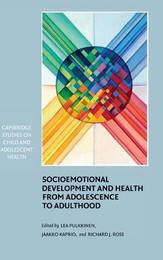
|
Socioemotional Development and Health from Adolescence to Adulthood
Hardback
Main Details
| Title |
Socioemotional Development and Health from Adolescence to Adulthood
|
| Authors and Contributors |
Edited by Lea Pulkkinen
|
|
Edited by Jaakko Kaprio
|
|
Edited by Richard J. Rose
|
| Series | Cambridge Studies on Child and Adolescent Health |
|---|
| Physical Properties |
| Format:Hardback | | Pages:440 | | Dimensions(mm): Height 229,Width 152 |
|
| ISBN/Barcode |
9780521846318
|
| Classifications | Dewey:155.5 |
|---|
| Audience | | Professional & Vocational | | Tertiary Education (US: College) | |
|---|
|
Publishing Details |
| Publisher |
Cambridge University Press
|
| Imprint |
Cambridge University Press
|
| Publication Date |
3 July 2006 |
| Publication Country |
United Kingdom
|
Description
This 2006 book is based on two longitudinal studies of behavior development, both conducted in Finland, a living laboratory setting for longitudinal research. Much of the book reports results from a longitudinal study begun in Jyvaskyla, Finland, in 1968, when its participants were school children. This longitudinal study is complemented by two Finnish twin-family studies, with parallel measures and overlapping aims, to yield insights into genetic and environmental sources of variation in early development and later outcomes. An array of findings from the two sets of longitudinal studies are presented, set within a theoretical framework of socioemotional development, and focused on both individual and familial predictors of health-related outcomes from childhood to early adulthood. Many contributors to this edited volume represent a second-tier of Finnish-USA collaborators. They analyzed data from the longitudinal studies as part of their advanced training, and their contributions to the book report results of such analyses.
Author Biography
Lea Pulkkinen is Professor of Psychology, Emerita, at the University of Jyvaskyla in Finland. She is the Director of the program on Human Development and Its Risk Factors and of the Psykocenter in the Finnish Centre of Excellence Program. She was President of the International Society for the Study of Behavioural Development (ISSBD) in 1991-1996. She also has served as the Dean of the Faculty of Social Sciences, Head of the Department of Psychology, Director of Family Research Center, Vice-Director of the Agora Center, and on a number of national committees including the Science and Technology Policy Council of Finland. She received the Finnish Science Award from the Ministry of Education in 2001 as well as many other national awards. In 2003, she received the Aristotle Prize from the European Federation of Psychologists' Associations (EFPA) and in 2005 she received the Distinguished Scientific Contributions to Child Development Award from the Society for Research in Child Development in USA. She has conducted an ongoing longitudinal study (JYLS) since 1968 funded by the Academy of Finland and collaborated in a twin study (FinnTwin 12) since 1991. She has over 350 original publications in several journals on human development and has edited the book, Paths to Successful Development, with Dr Avshalom Caspi (Cambridge University Press, 2002). Jaakko Kaprio is Professor of Genetic Epidemiology at the University of Helsinki and Research Professor in Behavioral Genetics at the National Public Health Institute. He has worked with the Finnish Cohort studies since 1976 and has been responsible for a steady expansion of the included cohorts and very extensive phenotyping through repeated questionnaire and interview surveys and recording-linkage to national medical registries. He is an internationally recognized expert in epidemiology and twin studies with over 350 original scientific publications, continuous NIH funding for the past 20 years, and he was recently elected President of the International Society for Twin Studies. He has published in leading medical journals such as the NEJM, JAMA, Lancet, Nature Genetics, Nature Neuroscience, BMJ and PLoS Medicine. Richard J. Rose is Professor of Psychology and Medical Genetics at Indiana University. He was a founding member of the Behavior Genetics Association and has served as its president. He has been the Principal Investigator on NIH grant awards for the two FinnTwin studies. He has been a Senior Fellow of the Fogarty International Foundation of NIH and has received a NATO Travelling Scholar Award and a Senior Research Fellowship from the National Institutes of Health. His most recent research grant, awarded for continuation of FinnTwin research, was converted to MERIT award status. He serves on the Behavior Genetics and Epidemiology Study Section (BGES), National Institutes of Health. Trained as a Clinical Psychologist, his expertise is in developmental behavior genetics. His research places as much focus on environmental influences within families, schools, and neighborhoods, as on genetic dispositions in developmental transitions from early adolescence to early adulthood.
|